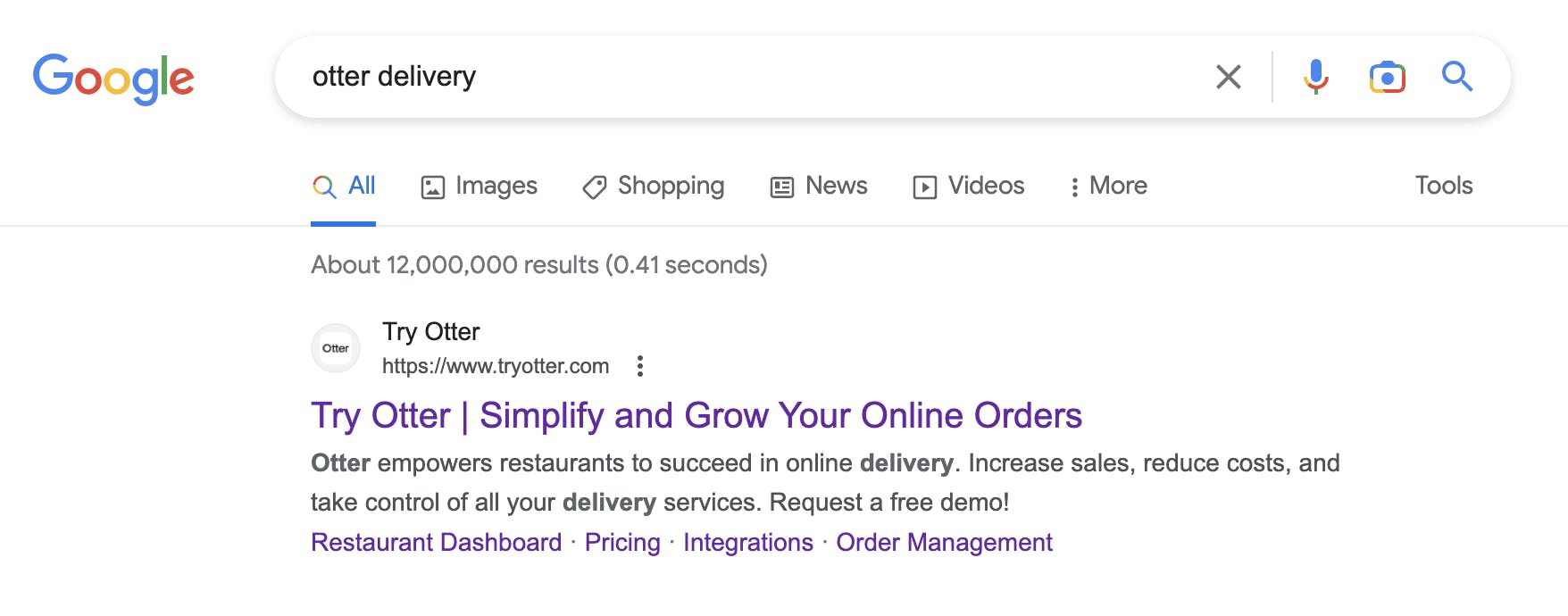
If you’re a restaurateur with a website, you may have heard the term “SEO” used online. Many sources discuss how useful SEO is for a restaurant’s profitability, but it often seems technical and difficult to understand. That’s where Otter can help! With this guide to Search Engine Optimisation, you’ll discover a powerful, cost-effective way to promote your restaurant online.
SEO is key for building awareness of your brand, and it can help you gain a greater understanding of your target audience. With the right strategy, it also serves as a major driver of online profit! Let’s take a deep dive into the world of restaurant SEO, and see why it’s so important to your restaurant’s digital success.
What is Restaurant SEO, anyways?

Search Engine Optimisation is the way that search engines decide where to put your website on their results pages. Websites with high SEO are placed closer to the top of the results page, encouraging users to engage with them. If your website has poor SEO, it will be placed at the bottom of the results page or on another page entirely. This harms your websites visibility, and prevents users from visiting and interacting with your business online. As a restaurant, this also hurts your profitability if customers don't know about your business, they can't order from you.
Why is Restaurant SEO valuable?

Consider what your restaurants website is typically used for: promoting your business, interacting with your audience, and facilitating direct orders. Restaurants with high SEO can leverage direct lines of communication with new and existing customers. This ensures customers can find your business online, making it easy to order from you. Without strong SEO, customers wont be able to quickly access your website, making profitable engagement far more difficult and unlikely.
In a time of rapid inflation, search engine optimisation is one of the most cost-effective ways to promote your restaurant. By the nature of todays top search engines, SEO and many of the tools used to strengthen it are free. When you utilise SEO, you gain a marketing channel with one of the highest profit margins available today. Once you combine this value with an equally-profitable ordering platform on your website, you'll open a new digital revenue stream.
How do I start using SEO?

Like any marketing strategy, getting the most out of SEO requires a strong understanding of your customers’ tastes and preferences. Before you start editing your website, research what your target audience wants to know more about. Consider what a person might type into a search engine to find your website.
What kind of cuisine do you serve? Where is your restaurant located? How could a customer find your business online?
Once you know what search queries (or keywords) your eaters are using, start updating your restaurant’s website with them! Incorporate these keywords into your website’s text, visual assets, and page data in an organic way. As you do, search engines will recognise your business’s subject matter, and begin to optimise your website’s search engine performance. (Be sure not to overload your website with keywords – search engines will know when you’re being insincere. Use a tool like Yoast to employ keywords intelligently, and focus on your community’s highest-ranking niches!)
When your updates are complete, congratulations – you’ve upgraded your restaurant SEO! Update your keywords on a regular basis, and you’ll start to see your restaurant’s website rise up the results page. Customers will now be able to quickly find your restaurant by searching for it online!
What are some general SEO tips?

Several resources exist to make SEO easier. You can get started by creating or claiming your restaurant on Google Business Profile (you can find more information about this on the next section).
SEO websites like SEMRush and AHRefs both offer a variety of services to help you discover your customers search habits. Many organic marketing platforms like HubSpot also offer instructions and tutorials on determining the best SEO strategies for your business's needs. Leverage these resources to build a strong foundation for your SEO efforts.
Something else you'll want to keep in mind is the jargon surrounding SEO. As a digital concept, its surrounded by a few abbreviations and terms that are commonly used to describe its functions. Feel free to save this glossary as a record of them all:
- SEO: Short for Search Engine Optimisation. This is how search engines (like Google and Bing) determine a websites placement on a results page.
- Keyword: A word or phrase that a customer would search for to find a website. (For example: Googling Covent Garden pizza shows a collection of websites for pizza restaurants in Covent Garden.)
- SEM: Short for Search Engine Marketing. This is the act of using SEO to promote a business through a search engine.
- SERP: Short for Search Engine Results Page. When you search for something on a search engine, it will bring you to one of these: a list of websites related to your search.
- SER: Short for Search Engine Ranking. The order, from top to bottom, of websites displayed on an SERP. Websites with the highest SEO have an SER of 1, and so on.

Don't forget: You can enhance your restaurants SEO even more outside of your website! By hosting your own ordering service or promoting your restaurant on a major delivery platform, your business can appear several times on an SERP. Determine which SEO strategy works best for your restaurant, and ensure your business is always easy to search for.
Create a Google Business Profile for your restaurant
Have you ever searched for a restaurant on Google and a listing comes up on the right? Thats Google Business Profile
Formerly known as Google My Business, Google Business Profile is a free tool that allows you to manage how your restaurant looks when someone searches for it on Google or Google Maps. Once you create or claim your restaurants Business Profile, you will be able to personalise it with contact information, descriptions, operating hours, photos, offers, and more. You can even let customers make reservations and order food online directly from your listing.
Here's why you should have a Google Business Profile for your restaurant:
- Manage your restaurants listing. Creating a Business Profile for your restaurant allows you to control the information displayed on Google Search and Google Maps like your address, opening hours, phone number, ordering options, and more.
- Interact with customers. With features like sharing updates, responding to reviews, and adding pictures, you will be able to connect with your customers in new ways.
- Put your restaurant on the map (literally). Google results are optimised to help users find nearby businesses, so having a Google Business Profile for your restaurant will help people find you. Plus, you can even accept reservations and online orders from your profile, converting searchers into customers immediately.
Am I ready to get started with Restaurant SEO?

Yes! You now have all the knowledge and resources to optimise your websites search engine performance. Use these tools to expand your customer base, increase order revenue, and make your website instantly accessible! Restaurant SEO may seem heavy at first, but your business will gain a significant competitive advantage by mastering it.
Strong SEO strategies keep restaurants at the top of customer's minds — and results pages.